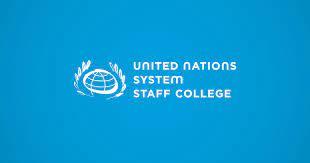
https://www.unssc.org/news-and-insights/blog/doing-no-harm-doing-good-wh...
This year the second SDG Summit will mark the midpoint the world set for itself to achieve the 2030 Agenda for Sustainable Development. Discussions on the relevance of the goals are affected by the sense of urgency to accelerate efforts toward sustainability, coupled with the sentiment that most of the goals will not be achieved due to progress being reversed.
The electric light did not come from continuous improvement of candles. - Oren Harari
There is a lot of talk about changing the narrative and using strategic interventions to ignite the transformation needed. One important question to ask is: Are you trying to optimize a system, or transform it? Changing the fuel for cars does not transform the system, rather it optimizes the old paradigm, since the rationale of individual mobility behind it remains the same. As the famous quote says: "The electric light did not come from the continuous improvement of candles." -Oren Harari
At the same time, recent global crisis, whether it’s the Covid-19 pandemic, the war in Ukraine or the effects of climate change and biodiversity loss, demonstrate that the core notions of the 2030 Agenda remain relevant. Advancing toward sustainable development requires a focus on synergies through systemic approaches that unpack the various drivers affecting progress in priority areas beyond sectoral boundaries. A sustainability transformation at the global level also requires addressing cross-boundary spillover effects, i.e. considering the full consequences of a country’s social, economic and environmental policies on its own development, as well as on the ability of other countries to advance toward sustainable development.
The Policy Coherence and Systems Thinking for Sustainable Development online moderated course has been continuously providing this reflection to learn, exchange and feed discussions on the systemic transformation and adaptive leadership needed to address the challenges to sustainable development in an increasingly uncertain and complex world, through the lens of policy coherence and systems thinking.
Implementing the 2030 Agenda requires integrated approaches in policy and practice that focus on the interlinkages of human-planetary systems and subsystems. The overall goal is to devise interventions that maximize synergies and mitigate trade-offs intertemporally and across regions. Systems Thinking offers a methodology to expand and implement the increasing evidence and consensus on the specific areas and entry points needed for systemic transformation towards sustainable development.
Moving from “Doing no Harm” to “Doing Good”
Moreover, in a world where national commitments are essential for global sustainable solutions, a focus on policymaking and, thus, policy coherence is essential. Policy coherence is both an approach to understanding the barriers and drivers of sustainable development and a policy tool to integrate sustainable development's economic, social and environmental dimensions into policymaking processes. Focusing on policy coherence for sustainable development requires an appreciation of multi-sectoral linkages, multi-actor partnerships, horizontal and vertical coherence, as well as institutional and governance mechanisms. It also strengthens the focus on policy effects beyond the 'here and now, including also the 'elsewhere' and 'later'. Beyond the initial focus of PCD – Policy coherence for development – on ‘doing no harm’ – PCSD -policy coherence for sustainable development – asks us to explicitly aim at ‘doing good.’
Are you interested in learning more on the topic, and exchanging experiences with colleagues from all over the world? Register here by 12 May 2023: https://www.unssc.org/courses/policy-coherence-and-systems-thinking-sustainable-development-0
Resource to link: PCST report










Add new comment